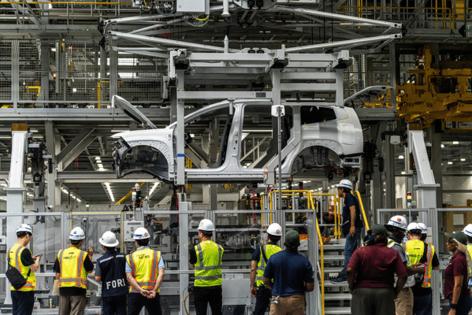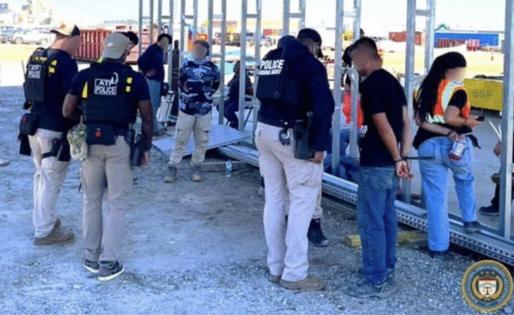Wealth, jobs sparked local anger in Georgia before Hyundai raid
Published in News & Features
Before the immigration raid on the battery plant in Georgia that’s upended relations between the U.S. and South Korea, there was growing resentment from locals who felt left out of the jobs, economic opportunities and wealth created by the factory, part of a massive $7.6 billion manufacturing complex anchored by Hyundai Motor Co.
In the nearby port city of Savannah, where over half the population is Black and most elected officials are Democrats, leaders questioned how jobs were being filled at the battery plant, a joint venture by the Korean companies Hyundai and LG Energy Solution Ltd., and other nearby factories. Georgia Gov. Brian Kemp, a Republican, and local politicians had touted the development as a boon to the entire region, eventually offering more than $2 billion in taxpayer-subsidized incentives.
“First we’re told to support this because it will create jobs — then we’re told, ‘Because you’re not trained, I’ve got to bring these other people in,’ ” said Jamal Toure, an adjunct professor at Savannah State University and host of a radio show and podcast, where the topic has been discussed. “How do we benefit from this? For the average citizen, the average African American here, they don’t see the impact.”
Some 25 miles west of the city, the sprawling industrial complex that Hyundai calls Metaplant sits in once rural Bryan County, where over 70% of residents are white and President Donald Trump and other Republicans have received strong support. The politics and demographics are different, but the concern over who wins from the surge in economic development is similar.
“They said Hyundai is coming, and we’re just going to make you all bigger. We’re getting new everything,” Megan Lee, a 26-year-old who grew up here, said as the sound of bulldozers and backhoes rumbled at nearby construction sites. Lee said the truck stop where she works booms with business as a result of the plant, but she’s not sure that she and her neighbors directly benefit. “I liked us being a small town.”
The fallout from the raid last week that saw 475 people, mostly Koreans, rounded up by Immigration and Customs Enforcement agents and accused of working illegally is still playing out in Washington, Seoul and in corporate boardrooms around the world. The Korean workers are flying home on Thursday after the countries’ top diplomats met in Washington in a bid to alleviate the tension between the governments.
Among local opponents, who run the gamut from activists focused on jobs for underserved communities to anti-development forces who broadly oppose change, there’s often confusion about how the various factories operate and the difference between temporary jobs needed to set up a plant and longer-term roles once operations begin. But as Trump pushes for more foreign investment to fuel a manufacturing renaissance in the U.S., tensions like those seen around the EV battery plant outside Savannah are a risk for his ambitions.
And indeed, Hyundai Chief Executive Officer José Muñoz said in an interview that construction work at the battery plant is being delayed at least two months as the companies involved grapple with worker shortages.
South Korean firms from LG Energy to SK On Co. are building some 22 plants in the U.S., but the companies say the projects hinge on moving trained engineers quickly across international borders — a practice being undermined by visa bottlenecks and heightened immigration scrutiny.
Asian companies dominate the market for EV batteries, having developed the technology in their home countries for decades. Automakers looking to bring the expertise to the U.S. have formed joint ventures to build new plants, and it’s common for tensions over language, workplace culture or intellectual property concerns to arise during the process, according to two U.S. battery manufacturing executives who asked not to be identified discussing sensitive issues.
The manufacturers typically hire American companies for construction of the buildings that house production lines. But when it comes to installing specialized equipment, they rely on employees of the companies that sell it — typically Korean, Japanese or Chinese — to work in the U.S. temporarily to install the equipment at the plants. That’s because they are trying to replicate a finely tuned system where tiny flaws like a leak or loose pipe can contaminate an entire line, causing defective batteries. Once the equipment is up and running, local people are trained on the technology to fulfill permanent jobs, the executives said.
Other Asian manufacturers with plants in the U.S. have tapped their overseas personnel for some technical roles during construction, but those specialists typically numbered in the dozens not in the hundreds, according to people familiar with their operations.
The manufacturing complex in Georgia stretches along Interstate 16 in the town of Ellabell, with pristine new streets bearing names like Genesis Drive and Kia Drive cut through pine forests. Hyundai’s vehicle assembly plant is already producing the Ioniq 5 and Ioniq 9 EV models and has plans to expand output.
A spokeswoman for the Hyundai Metaplant, Bianca Johnson, said the immigration action didn’t affect the main auto manufacturing plant. She directed questions about hiring and the immigration raids to a spokeswoman at its battery factory partner, LG Energy Solution, who declined to comment on its hiring practices.
Angela Hendrix, a spokeswoman for the Savannah Economic Development Authority, which played a large role in luring Hyundai to the region, said the detained workers weren’t full-time permanent employees. Instead, they were a mix of people working on construction, installing equipment or training people how to use that equipment.
She added that the Hyundai assembly plant and onsite affiliates have more than 2,800 employees. A Hyundai spokesman said more than 50% of the workforce at the factory is Black.
Some Savannah-area firms that supply labor to Korean-owned parts makers said the suppliers have shown a preference for employing Korean workers or contracting with Korean-owned personnel companies, creating some friction in the community.
One agency owner said he provided about 60 temporary workers to a Hyundai supplier in Rincon, Georgia, northwest of Savannah, about a year ago. The company ended the contract and hired replacements from Korea, the agency owner said, asking not to be identified to avoid upsetting companies he hopes to work with in the future. The workers were in assembly roles and wouldn’t ordinarily be considered skilled labor, the owner said.
An executive at a second Savannah-area staffing firm, who asked not to be identified for fear of disrupting her business, said Hyundai’s suppliers largely draw labor from area firms owned by fellow Koreans. To cope, the owner, who isn’t Korean, began partnering with a staffing agency owned by Koreans, supplying workers to the firm which otherwise didn’t have its own pipeline of talent, she said.
She added that many workers in Savannah have soured on Hyundai and its suppliers because of strict work rules that can lead to quick dismissal for minor infractions.
From the north Georgia mountains, Michael Aubrecht runs a boutique recruiting firm specializing in battery and energy-storage professionals. He said he approached the battery JV in the past, only to be told the company wasn’t interested in his services and had its own network of people to tap for the hard-to-find roles.
Aubrecht said he was glad to see last week’s enforcement action. “They wouldn’t consider U.S. citizens for those roles,” he lamented. “They said, ‘No, we’ve got our own group of people.’ ”
Kemp, Georgia’s governor, said that his state is committed to its relationship with South Korea and Hyundai, and appreciated their commitment to adhere to state and federal laws. “As President Trump has also noted, our relationships with the government and businesses of Korea stand on a firm foundation,” he said.
Since the ICE raid, there’s been a slowdown at many of the new businesses catering to the influx of Korean workers. “They are scared to come out,” explained Savannah native J. Brown, who said employees at his landscaping company are also fearful of ICE confrontations. “Would you come to work now?”
At 912 Korean BBQ & Hot Pot, Hyundai workers had almost disappeared in the past week, according to a server named Lulu.
But other, less conspicuous locales seemed to be doing better. One spot down the road, Jin Guk, was packed with more than 50 diners as a Korean golf tournament played on the LG flat-panel televisions hanging on the wall.
Workers were expecting business to drop off because of the raids, according to a young man at the cash register, who appeared to be the only worker in the restaurant who spoke English and Korean. But that hadn’t been the case, he said.
One Korean engineer working at the battery plant said that he arrived on a temporary visa to install equipment and train workers. The man, who asked to be identified only by his surname Lee, and who speaks English haltingly, said he had arrived in Georgia just one day after the immigration raid.
“We help with setup and installation, and some supervising,” Lee said outside Jin Guk. “For three to six months, we train and make sure everything is working right. After that, we go back to Korea.”
©2025 Bloomberg L.P. Visit bloomberg.com. Distributed by Tribune Content Agency, LLC.










Comments